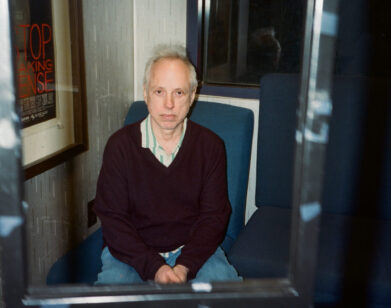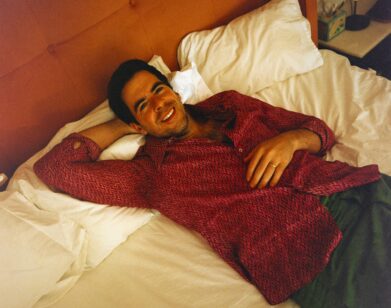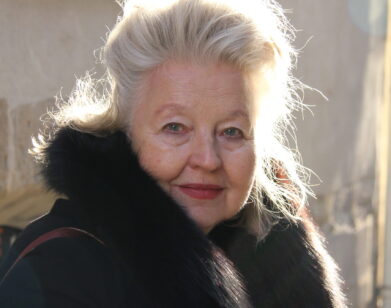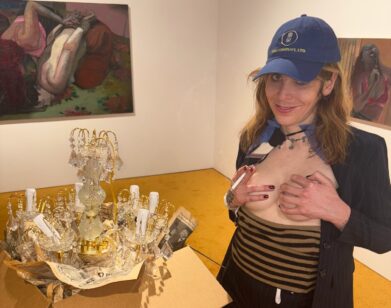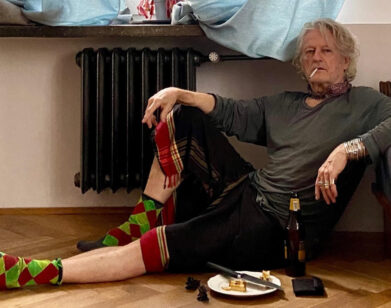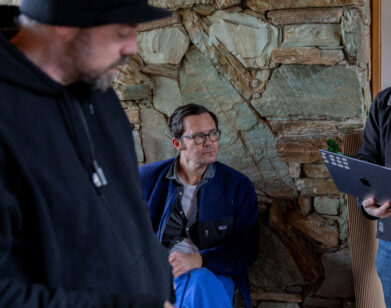Audrey Tautou in Full Bloom
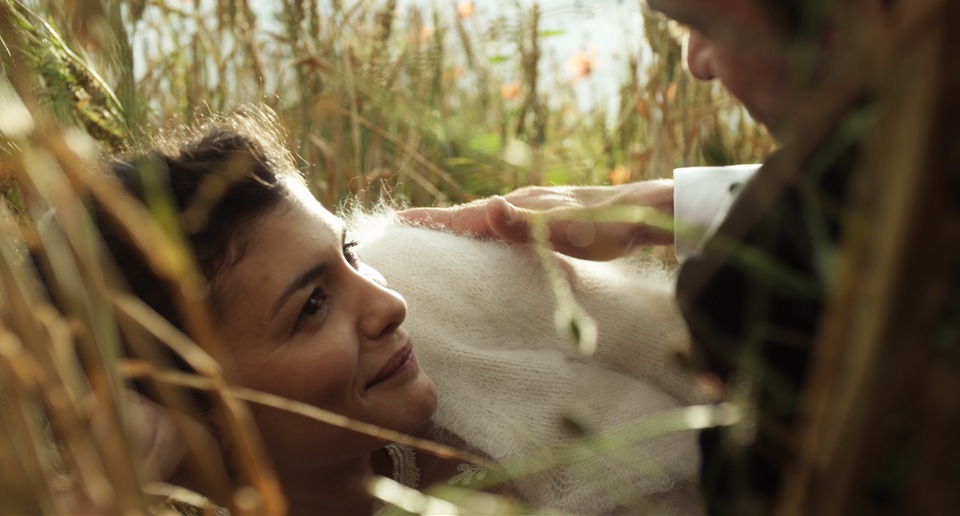
COLIN (ROMAIN DURIS) AND CHLOÉ (AUDREY TAUTOU) LIE IN THE GRASS IN DRAFTHOUSE FILMS’ MOOD INDIGO. COURTESY OF DRAFTHOUSE FILMS.
Elongated elastic limbs. Cloud hovercrafts. Miniature men dressed in mouse suits. A philosopher named Jean-Sol Partre. A piano that mixes cocktails when played. Director Michel Gondry has long created worlds that inhabit the nexus of the bizarre and the fantastical, but for his latest film, Mood Indigo, the bizarre and the fantastical are supplied from someone else—in this case, French polymath Boris Vian and his 1947 novel Froth on the Daydream.
Gondry adapts Vian’s tale—a whirlwind love story between a rich bachelor, Colin (Romain Duris), and the improbably sweet Chloé (Audrey Tautou), who shares a name with Colin’s favorite Duke Ellington tune—into a stop-motion-spiked treatise on the improbabilities and tragedies of love and fate. The pair giddily zoom through a dreamlike version of Paris, until on their honeymoon, a flower spore plants itself in one of Chloé’s lungs, causing a water lily to grow—a fatal diagnosis. The only remedy is to surround her sickbed with flowers, and as Colin’s fortune dwindles, spent on the fast-fading bouquets, he takes on a series of hapless jobs to muster the funds for Chloé’s care. The lushly saturated vision that Gondry establishes in the first half of the film darkens to a morose black and white as Chloé’s health, and Colin’s circumstances, take a turn for the worse.
Froth on the Daydream is a cult classic in France, where star Audrey Tautou (Amélie; Coco Before Chanel) read it as a teenager. Interview recently spoke to Tautou while she was in Paris about reteaming with her L’Auberge espangnole trilogy co-star Romain Duris, her in-the-works photography projects, and making animations for Michel Gondry.
COLLEEN KELSEY: How familiar were you with Boris Vian’s novel before you started working on this with Michel?
AUDREY TAUTOU: In fact, I’d been caught by the story when I was a teenager. Many teenagers in France [are] too. It was a special book for me. I read it when I was maybe 15 or 16.
KELSEY: What about it was so important or magical for you?
TAUTOU: I think the way he manages to break all the rules with imagination. It’s very surrealistic and poetic. There’s a lot of images. It’s a very unconventional book and I think that’s what I loved. Also, because of the love story between Colin and Chloé. I don’t know why, especially. It’s really playful and really free, in a way.
KELSEY: I have to ask, what would be your reaction if you found out a water lily was growing inside your lung? In the story it’s very tragic, but it’s a romantic sort of idea.
TAUTOU: Yes, I think and this “impossible love story” like Romeo and Juliet is something very powerful and emotional. I found it very touching. The purity of their love is so beautiful as it goes darker and darker—very beautiful, poetic, and romantic.
KELSEY: How do you see yourself in comparison to Chloé?
TAUTOU: I think that maybe I try to find a likeness that I could have had when I was much younger, when you’re more naïve. It was nice to play that and to not only see the dark side of the world.
KELSEY: If you, like Chloé, had to be surrounded by flowers all day every day, what kind would they be?
TAUTOU: I don’t know, maybe roses. I love coquelicots [poppies], a red little flower that you can find in the field, that Monet painted.
KELSEY: This was your first time working with Michel, right?
TAUTOU: It was funny. I met him a few weeks before he asked me to do the movie. He was doing his exhibition about film and cinema [2011’s traveling “Amateur Film Factory”], something very playful, everybody could create their own movies. I met him through that. One day, he sent me a little animated short movie that he made for me, asking me to play in the movie. But I was so surprised that I didn’t understand! Finally it was clear and I was really happy and thrilled. He’s a director that I really love. He’s so special and he’s so creative and unconventional. I really like directors if they have a really strong universe and aesthetics.
KELSEY: Speaking of a universe and aesthetics, Michel really created a specific one with this movie.
TAUTOU: Every day it was marvelous to discover something new, a decoration, or in the accessories. All of the special effects were made in-reel. It was kind of dream. It was marvelous and sunny. Michel is a storm of ideas. You can’t follow him on everything because he’s much quicker; he’s four steps forward than you. But you like to be in his head and in his brain. You just try to enjoy it as much as possible.
KELSEY: What was it like working with Romain [Duris] on this film? You two have worked together over the years.
TAUTOU: Yes! We’ve just done two movies together. In fact, we didn’t have that many days together on these past two movies because I had small parts. I think I really discovered him on this shoot. I was really happy to work with him again, because he’s a great actor, very talented, a very kind, generous person.
KELSEY: In this movie especially, and others that you’ve done, such as Amélie, there’s a really sharp aesthetic of Paris that’s romantic and fantastical. What’s so special for you about the city and making movies there?
TAUTOU: Paris and French cinema gave me the most interesting parts, but I had great experiences shooting with Stephen Frears in Dirty Pretty Things and I look to work again in English, but it’s a different business. It’s difficult to reach interesting parts. It’s not a coincidence, but the way my life is going, but it’s not that I rejected anything, especially American or English movies.
KELSEY: What about a script will capture your interest?
TAUTOU: I think when the director has a very strong personality. I like to be rooted by the cleverness and the universe of somebody, and after that, the story. I notice a movie if it’s a movie I’d love to watch at the cinema. The characters are important to me, the characters will have an interesting, intimate domain through the movie. When an adventure seems different from what I had done before. I like surprise. I like to go everywhere, to discover. That’s what I’m trying to do.
KELSEY: I read that you’re working on writing a photography project. What are you working on?
AUTOU: I’m trying to do a photo project. It’s a project about self-portraits, but it’s very difficult. I do everything by myself and it takes me ages to manage just one picture, so it drives me nuts. I think that when you create something or at least try to create something, you slither between excitement and pleasure and you understand this huge emotional frustration. You did one feat, then you go back one.
KELSEY: What kind of camera have you been using?
TAUTOU: I’m using an analog camera, just to make it even more complicated. I really think that one day I will make it. A little thing that’s funny… at the end of the movie, they have a little drawing, an animation. Michel Gondry asked me to do this drawing. And I said, “Oh, gee, yes!” I was very excited, but I was scared and I was thinking, “Oh my god, this is going to be bad. Maybe he’s going to feel obliged to put it in the movie.” So I told him, “If I don’t manage and if you don’t like it, please take it out, there’s no problem.” Three months after, I finally did it and was like, “I’m doing it!” It took me hours and hours and hours, really for a few seconds. But in a way, it was there to help me.
KELSEY: There’s pleasure and pain in the process.
TAUTOU: Yes! It’s much more peaceful to be an actress, for me, because I think I can steal some confidence from the director I’m working with. I feel strong; I have no fear. But when you are your own director and your own everything, it’s really another story.
MOOD INDIGO IS OUT FRIDAY, JULY 18 IN NEW YORK AND LOS ANGELES.

